AARP Hearing Center
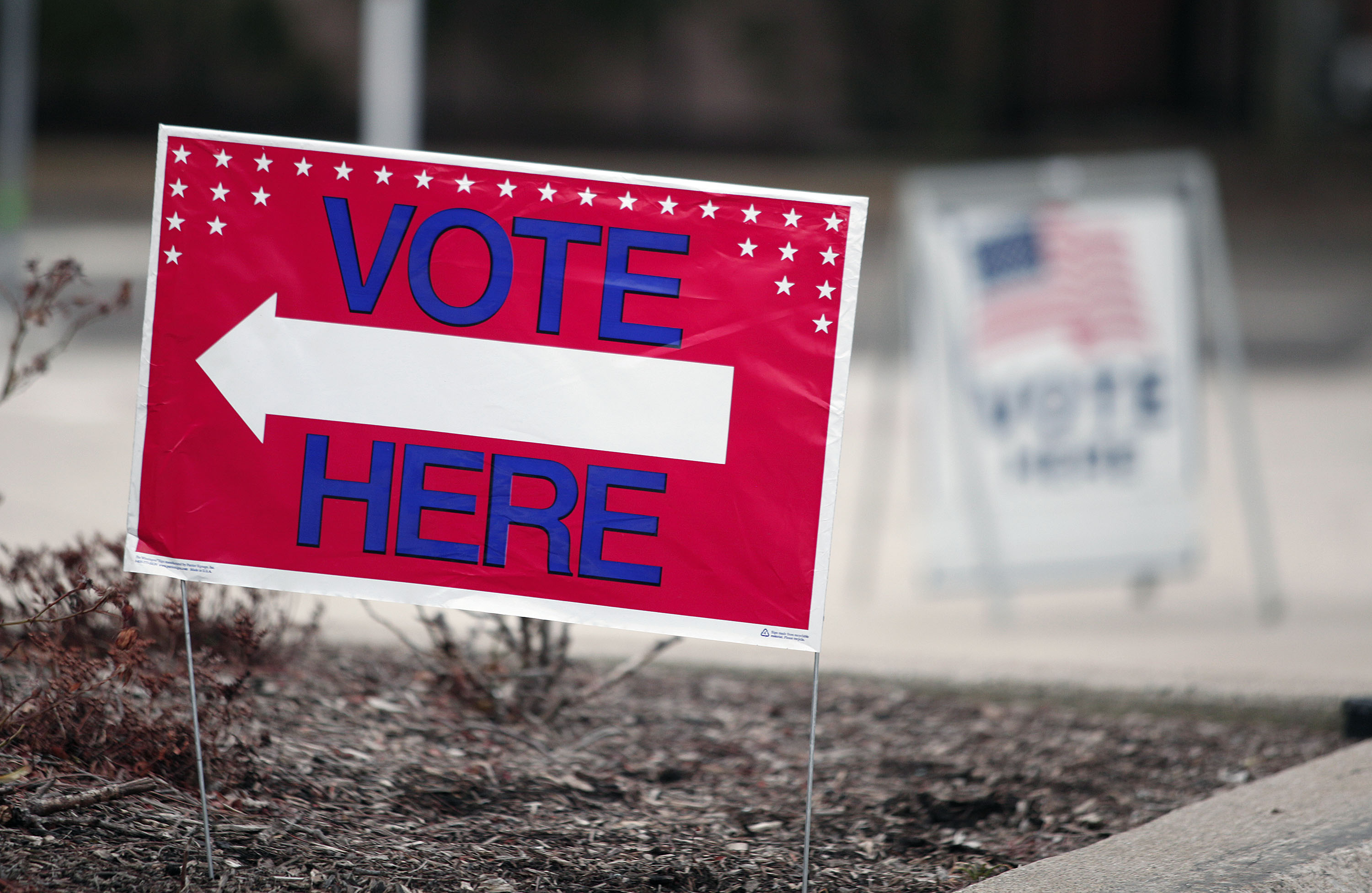
Hawai'i voters will decide several closely watched races on Nov. 8, including the gubernatorial contest to replace Gov. David Ige, who is term-limited and cannot run for reelection. Candidates include former Lt. Gov. Duke Aiona (R) and current Lt. Gov. Joshua Green (D). AARP Hawai'i spoke with the gubernatorial hopefuls to learn where they stand on key issues for 50-plus voters. Here's what they had to say:
What will you do to support family caregivers through policies such as enhanced respite services, access to telehealth, caregiver education and help with out-of-pocket caregiving costs?
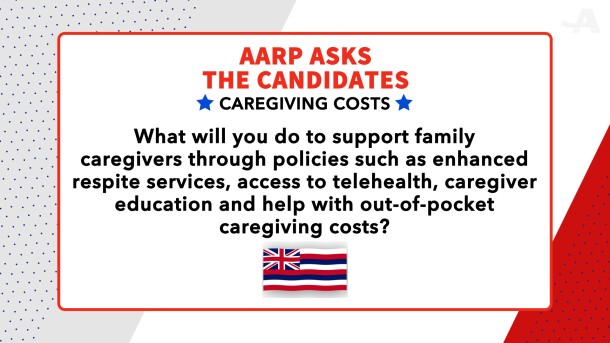
Aiona: You know, I had a personal experience in regards to caregiving just recently. One of my elder cousins was suddenly put in a situation in which her caregiver passed away. And as such, I was thrust into that. I searched desperately how I could help her with respite care, and I found an organization at St. Francis called CARE Plus in which they provided free services for me to get started in regards to caregiving. I think there are many resources out there. The city and county of Honolulu's elderly care division has such a great resource to that. In addition to that, we have 808 Community [Resources]. In addition to that, we have Caregiver Foundation. As far as telehealth and telemedicine, I think it's a shame that our insurance companies are not covering at least the telephonic part of it. That needs to be expanded, that needs to be covered, because our seniors, more than anybody else, need to have telephonic access to health care.
Green: I appreciate this question. My father's currently wrestling with the reality that he has to take care of my stepmom, who has Alzheimer's disease. So I see how hard it is on both of them. What we need to do is provide extra resources. I've been one of the proponents of getting more kupuna care moneys to our respite caregivers and all of those who are taking care of those in the Silver Tsunami. Silver Tsunami means as we get towards 2030, there's a lot more elderly individuals. So people like my dad and others will have some chance to get respite. We should provide, actually, caregivers to spell them. We also have to have facilities that can do adult day care. All these things are important, but I was one of the initial sponsors of the Kupuna Care Bill, and Hawaii was the first in the nation to do that. This is the kind of thing that you have to do. We have to have a mixed capacity to have people at home, where they do best and they can be in the care of the people that love them, and also sometimes at places where they can get extra professional care.
If elected, how will you further lower prescription drug prices with state action?
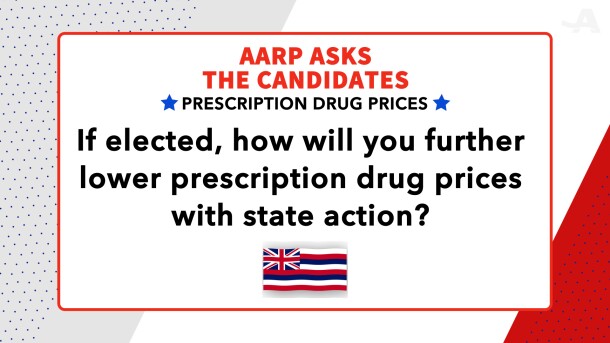
Green: Well, this is personal for me because as a primary care physician and an ER physician for our kupuna in the state of Hawaii, I've constantly fought to find ways to make them actually be able to afford their medications. The state can get involved in several ways. One, we need more transparency. People should know what they pay for their medications so they can budget it. We also have to take on the PBMs, those pharmacy benefit managers. A lot of times they do do rebates, but it doesn't often find its way back to people who need it the most. Those are the kind of things we need to do. But it's better for people to be able to afford their medications and actually take them to get better health outcomes, and that's been my experience as a doctor in our state. Finally, we have to be able to negotiate with Canada, and any state that can do that, that has that negotiating power, will lower the cost for our kupuna.
Aiona: I would support legislation that reduces the price of prescription drugs. Our Legislature has submitted various proposals to assist in that. One is to have more price transparency. A second is to tie the price of our prescription drugs to Canada. But I believe we can be more bold. One, we can have a direct importation from Canada of our prescription drugs. Second, we can set up a board, a commission, that would review the prices that pharmaceuticals are setting for our prescription drugs and set an upper limit that would require reimbursement from our insurance companies. We can learn a lot from our sister states, and I hope that we do so.
If elected, how will you make more affordable, quality long-term care options available to kupuna and their families?
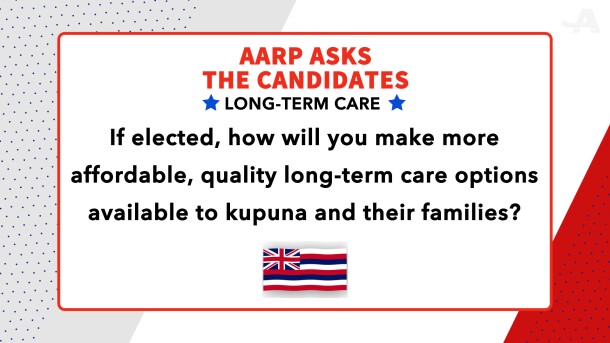
Aiona: For our kupunas, aging in place is very important. Thus, I understand the importance of having a home. In our Hawaii homeownership solution, we have proposed to convert rentals to ownership. In other words, tenant-owned buildings. A lot of our kupuna rent; they should be the owners of those buildings, and I would move full-heartedly on that. In addition to that, I think ADUs are another part of it. We should have ADUs that are specific for kupunas so that they can just age at home. Whether it be what we call in-law suites or grandma suites, I think there should be a separate exemption to that or specific rules that are in line with ADUs that cater to our grandparents and to our elderly so that they can age in place and have a good elderly life.
Green: As a physician, this has been an issue that I'm very close to. The hospital I've worked at for more than 20 years when I'm not serving as lieutenant governor or senator or rep has long-term care beds, 16 long-term care beds in addition to the ER, and I've seen people come and go, but it's just not enough. We have to have a lot more long-term care capacity in our state. There should be tax incentives for people who want to deliver care to those on Medicare or suffering and only on Medicaid without any other resources. These are the keys to making sure that we have economic capacity to actually build these facilities. But it's not just building the facilities. It's also making sure we have nurses, LPNs, RNs, all these professionals, they have to be in our state, and the way to do that, to make it possible for them to live in the state, is to build housing for our workforce, our health care workforce, and that is also going to be accompanied by loan forgiveness and loan repayment for these professionals. That's how we take care of our kupuna best.
What will you do to make sure the Hawai'i retirement savings program is successful and all workers gain access to payroll savings?
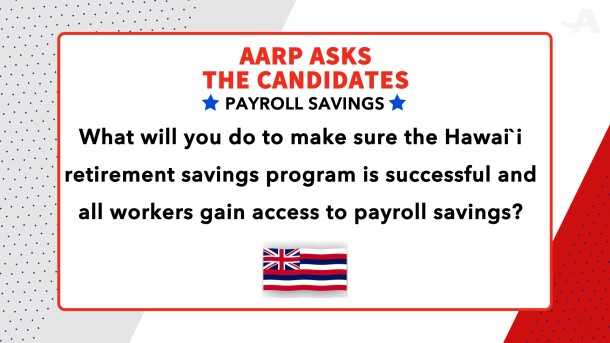
Green: I was really pleased to see that the state of Hawaii stepped up, our colleagues at the Legislature, to make sure savings were possible, especially as people get deeper into their careers and become older. The reason for this is there's a lot of adult poverty that goes unnoticed. A lot of elders, like the woman named Charlotte, who we helped take care of who was on the streets because she became so poor, destitute and homeless, need extra care, not just respite, but they need economic care. So what I will do is bring my director of DBED and the director of taxation together with some of the UHERO (University of Hawaii Economic Research Organization) experts who do economics for our team, and I will bring them all together to make sure that we have the most comprehensive, simple and straightforward plan to make savings possible through these special savings programs that we've all seen. They're like 401(k)s, basically. But you should have an opportunity no matter who you are to do this. Not everyone has the benefit of a pension or some special retirement from their job. Everyone should have this opportunity, and our experts will do it with you.
Aiona: Great program. I'm glad that we are joining the rest of the states in the United States in regards to enacting that type of program. As governor, I need to know, I need to make sure, first of all, that it's timely enacted; that we identify the businesses that are applicable to this program; that we identify the workers or the employees that, because this is a unique law in the sense that employees have to opt in as opposed to being just notified about this program. So we need to know that we make sure that we notify them, and most importantly, make sure that the employers themselves, who have no retirement plan, understand that this is a state-facilitated program, that they need to be a part of it, and more importantly, that they do not contribute a single dime to this program. These are about IRA Roths, and we want to make sure that all of our employees have that retirement when it's all said and done.
Also of Interest:
- Learn how to vote in Hawai'i at aarp.org/hivotes.
- Follow AARP's political coverage at aarp.org/elections.
- Keep up with local events and AARP advocacy efforts at aarp.org/hi.































































